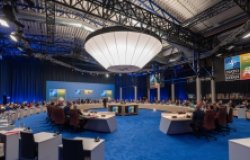Finland's Foreign Policy: European Ambitions and Global Challenges
A Director's Forum with His Excellency Ilkka Kanerva, Foreign Minister of Finland and OSCE 2008 Chairman-in-Office
Overview
On Monday, February 11, the Woodrow Wilson International Center for Scholars hosted a Director's Forum with His Excellency Ilkka Kanerva, Foreign Minister of Finland and 2008 Organization for Security and Cooperation in Europe (OSCE) Chairman-in-Office. Minister Kanerva's speech touched upon a variety of pressing public policy issues ranging from Russia's recent refusal to allow OSCE officials to fully monitor the March 2 elections, to the future role of the Nordic countries in Afghanistan.
Minister Kanerva began his talk by touching on the current US Presidential election campaign. The election, he stated, has captured the attention of the whole world because the votes cast by the American people will have ramifications far beyond America's borders. He then turned his attention to another rapidly approaching Presidential election the results of which will also have important implications – the Russian elections.
The OSCE's commitment to promoting democracy and human rights has roots which date back to the 1970s' Conference on Security and Cooperation in Europe (CSCE). Since then, this commitment has expanded, and now includes a mandate to send election monitors to observe elections in countries around the world. Minister Kanerva's first challenge as OSCE Chairman-in-Office for 2008 was to work with Russia's government to reach an agreement under which the OSCE could observe Russia's election process. In spite of his best efforts, Minister Kanerva said, no such agreement was reached, and unfortunately, no OSCE monitors will be in place to certify the election process as free and fair.
The OSCE also remains committed to conflict prevention, mediation, and mitigation. There are several ongoing conflicts within the OSCE space: in Trans-Dniester, South Ossetia, and Nagorno Karabakh. In these regions, the OSCE works as a forum for dialogue, and in concert with the EU, works to promote stability. Minister Kanerva spoke in particular about the need for the EU to welcome Kosovo, formerly a conflict zone, into the European community when it declares its independence, so that, with EU support, Kosovo can embark on the road to stability and prosperity.
Expanding the discussion beyond the borders of the EU and the OSCE, Minister Kanerva talked about Finland's policy towards Afghanistan. As a member of NATO's Partnership for Peace (PfP), Finland has contributed to NATO's International Security Assistance Force (ISAF) since 2002, and in cooperation with its Nordic partners, is actively developing civilian capacity in fields like crisis-management and reconstruction which are desperately needed in Afghanistan. Minister Kanerva emphasized the need to convince the people of the Nordic countries that it is in their best interest to be a reliable NATO partner by contributing substantively to Afghanistan's long-term growth and development.
Returning to Finland's neighbor, Russia, the Foreign Minister expressed concern over many recent developments in Russia, especially its increasingly assertive military posture and its retreat from the principle of free speech. In-spite of its now booming economy, Russia faces many internal, structural, challenges, ranging from rampant corruption to demographic decline if it is to continue to grow. The only way for Finland and the rest of the world to confront these issues, he said, was through continued bilateral and multilateral engagement with Russia.
Bringing his wide-ranging speech to a close, Minister Kanerva underscored the importance of strong EU-US relations in tackling all of the issues that he discussed, stating "There is practically no area I have mentioned today where good and well-coordinated transatlantic efforts would not be needed... we face all these complex challenges together, and they can be effectively solved only if we work together."
Documents & Downloads
Hosted By

Global Europe Program
The Global Europe Program is focused on Europe’s capabilities, and how it engages on critical global issues. We investigate European approaches to critical global issues. We examine Europe’s relations with Russia and Eurasia, China and the Indo-Pacific, the Middle East and Africa. Our initiatives include “Ukraine in Europe” – an examination of what it will take to make Ukraine’s European future a reality. But we also examine the role of NATO, the European Union and the OSCE, Europe’s energy security, transatlantic trade disputes, and challenges to democracy. The Global Europe Program’s staff, scholars-in-residence, and Global Fellows participate in seminars, policy study groups, and international conferences to provide analytical recommendations to policy makers and the media. Read more

History and Public Policy Program
The History and Public Policy Program makes public the primary source record of 20th and 21st century international history from repositories around the world, facilitates scholarship based on those records, and uses these materials to provide context for classroom, public, and policy debates on global affairs. Read more

Indo-Pacific Program
The Indo-Pacific Program promotes policy debate and intellectual discussions on US interests in the Asia-Pacific as well as political, economic, security, and social issues relating to the world’s most populous and economically dynamic region. Read more
Thank you for your interest in this event. Please send any feedback or questions to our Events staff.










